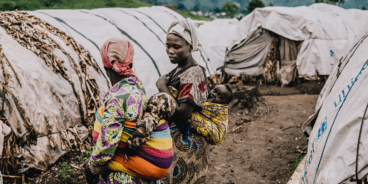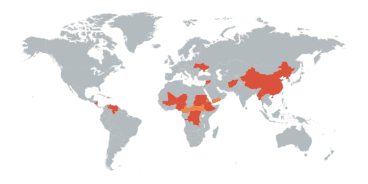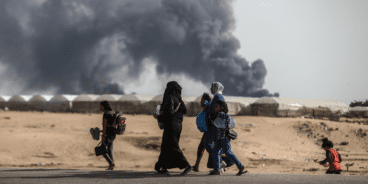
Atrocity Alert No. 74: Syria and Burundi
Atrocity Alert is a weekly publication by the Global Centre for the Responsibility to Protect highlighting situations where populations are at risk of, or are enduring, mass atrocity crimes.
Syria
After several months of decreased fighting in northwest Syria, on 19 September the Russian and Syrian governments intensified their airstrikes on opposition-held towns and villages in Idlib and Hama governorates, resulting in a drastic increase in civilian deaths. On 1 October the Syrian Observatory for Human Rights (SOHR) reported that September was the deadliest month for Syrian civilians so far this year, with 955 people killed, including 207 children. At least 158 of these civilian deaths occurred in northwest Syria during the last two weeks.
The renewed bombing campaign has had devastating consequences for essential civilian infrastructure, including schools and hospitals. In Idlib governorate alone at least five hospitals have been targeted since 19 September. On 28 September the UN Humanitarian Adviser on Syria, Jan Egeland, emphasized that “we cannot in any way tolerate the heavy toll on civilians and on medical and humanitarian workers just because they live under or next to designated terrorist groups.” Idlib governorate – where more than 1.5 million people live or have taken refuge – is largely controlled by armed extremist groups, including Hay’at Tahrir al-Sham.
Last Saturday, 30 September, also marked the second anniversary of the Russian government’s military intervention in Syria, which has led to the deaths of over 5,700 civilians, including 1,399 children, according to the SOHR. All perpetrators of war crimes and crimes against humanity in Syria – regardless of position or affiliation – should be held accountable. We welcome the recent prosecution of some alleged Syrian perpetrators by several European countries, and encourage all UN member states to fully support the International, Impartial and Independent Mechanism established to assist in the investigation and prosecution of all perpetrators of atrocities in Syria.
Burundi
Last Thursday, 28 September, the UN Human Rights Council in Geneva adopted a resolution welcoming the Burundi government’s assertion that it would now cooperate with the Office of the High Commissioner for Human Rights (OHCHR). The resolution requested OHCHR dispatch a team of three experts to collect information and ensure human rights violators are held accountable by the judicial authorities in Burundi. For more than a year the government of Burundi had refused to cooperate with OHCHR.
The following day, 29 September, the Human Rights Council also voted to extend the mandate of the Commission of Inquiry on Burundi for another year. The Commission has documented serious human rights violations and abuses committed in Burundi since April 2015, including arbitrary arrests and detentions, torture, extrajudicial executions, enforced disappearances, rape and other forms of sexual violence. The government has consistently refused entry into Burundi for the Commissioners, who issued a statement noting that they “remain deeply concerned by the persistence of these violations, some of which could constitute crimes against humanity.”
More than 400,000 Burundians have fled since April 2015 and most remain in neighboring countries. On 27 September Amnesty International reported that Burundian refugees are under increasing pressure to return home. Despite government assurances, interviews conducted by Amnesty and the Commission of Inquiry reveal that returnees remain at risk of arbitrary arrest, torture and potential extrajudicial killings.
Related Publications


